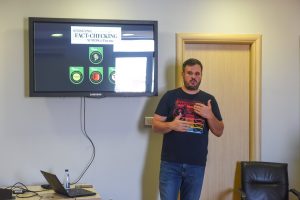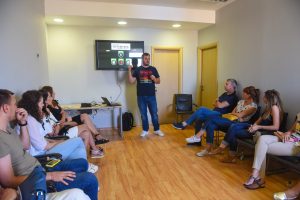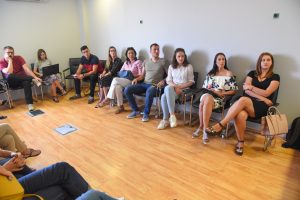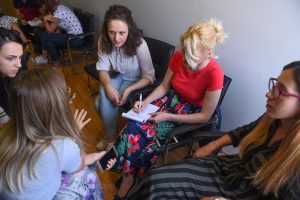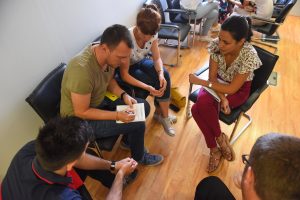Workshop on Media Literacy gathered journalists in Podgorica
The emergence of online space, a ton of information is being transmitted without detailed check-up which is the reason why institutionalization of media literacy through education system is so necessary, while journalists’ ethics remains as the only way for media to reach for audience credibly and sustainably.
This has been said by president of Civic Association “Why Not?” and team member of “Raskrinkavanje” – Darko Brkan, who took part as a lecturer on two days long workshop on media literacy for journalists. This workshop has been organized within the “Media Literacy Improvement in Montenegro” project, managed by MINA Agency and Juventas organization, with financial support of the US Embassy in Podgorica.
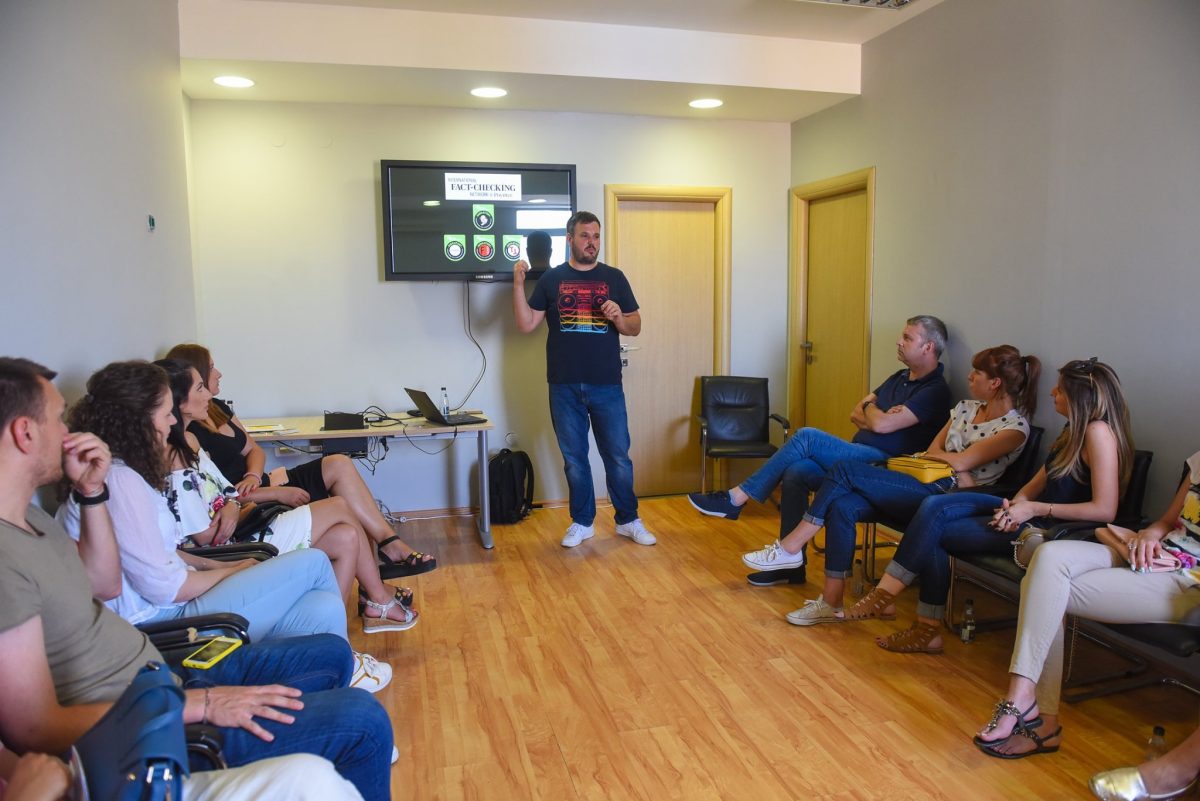
Brkan proclaimed that combating the disinformation has several segments and first of them being regulatory one, in which the most important stakeholders in society need to agree upon legal means to combat the disinformation.
„The second is journalist’s segment, where journalists should both establish and follow standards which would eventually help them to gain credibility. In the end, the society as a whole bears perhaps the greatest responsibility, which is exactly the main question of media literacy where everyone should get educated to perform fact-checking and media credibility check on their own, but also learn how to read media content properly,” said Brkan.
Media literacy as a term has been severely affected by the emergence of online sphere, which in short period of time took over traditional informing means, making it difficult to differentiate reliable information from those which contain some sort of media manipulation.
„However, there are some traditional methods. It is crucial to know the source of information, whether it was transferred or it is an original article of some media; whether it was signed, is there an author, which other sources are being used. We all need to get that sense of real news and real media monitoring, “ said Brkan.
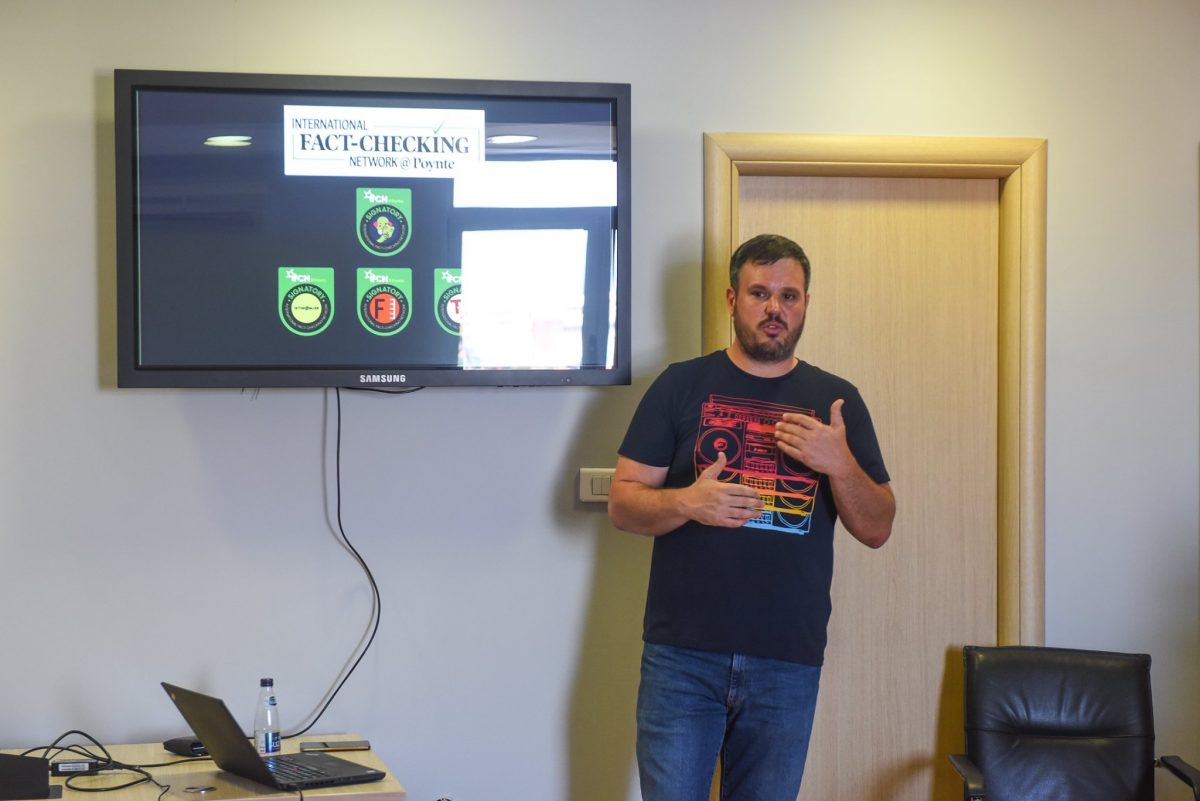
He estimates that media themselves need to become more literate and eventually start to perform more robust fact-checking on information that they share with their audience.
“That is where the problem lies. People considered something as a credible source of information and then they get internet as a source. Vast majority of people cannot distinguish different sources on the internet. When they learn that, another step is to learn which one of these sources are more credible than others; which journalists are endowed with journalist’s ethic and which are not. Generally, level of consciousness about all this is very low and we are coping with floods of something that has been called ‘anonymous websites’,” concluded Brkan.
Websites as such, as he explained, are producing disinformation or they are trying through media manipulation to earn some money from advertising.
„They are destroying the possibility or us to be media-literate which unfortunately becomes relatively often utilized by traditional media as well since they also realize that they would be better off if they adhere to some sort of media manipulation. In the end we have a picture which is not good at all, and I think that there is a lot of work to be done with both citizens and journalists in order to get this right: credible media should have a benefit from being credible, for making their own stories, for research and reporting,” said Brkan.
In his words, the institutionalization of media literacy in education system is a necessity on all levels.
“We cannot move on without that part being done. What we do, what has been done by similar organizations and certain media is just a drop in the ocean. That is why it is important to institutionalize all this over legislature, introduction in schools, all the way through media associations, self-regulatory and regulatory bodies. This needs to be a joint endeavor out of which we all should have a result,” holds Brkan.
He said that society is waking up and becomes aware of the problem since there is interest for media literacy, but on the other side journalists have two distinctive paths, he said.
“First is made of those who want media literacy to become a thing, since they do not have problems with charging for what they do. Big part of advertising cake is being taken away from them by fake, anonymous websites which does not stick to journalist’s code. In the second we have journalists who get used to lack of journalists’ ethics in their work, therefore they are resisting the concept as they need to alter their everyday means of work, not actually being aware that they can have benefit for all this,” Brkan explained.
He emphasized that there is room for progress in the period to come but it is essential for journalists to realize that standards and professional journalists’ ethics, credibility and sustainability are the only ways to reach the audience.
Ivana Vujković, an executive director of Juventas NGO, said that is fair easy to create fake news and disinformation.
“Of course, it is not ethical, put it pays off. That is the reason why we do have an epidemic of articles whose content, aim, intentions and impact that should be debunked in order to avoid similar occurrences in the future,” Vujović explained.
According to her, raising the media literacy among the general population but especially among youth results in creation of critical society which does not necessarily want to consume content which is apparently sensationalistic and fake which, she adds, helps to shrink the space for media maneuvering.
“In the end of the day, who among us wants to be manipulated in behalf of someone else’s profit? Trainings for journalists are crucial as well. We do have credible, educated people working in the media who need to be given proper conditions and should be supported to deal with ethical journalism that is based on truth and credible sources,” Vujović emphasized.
RTCG (trans. Radio Television of Montenegro) journalist Ana Popović said that it is very important that both journalists and citizens recognize all manipulations that is to be found in the media.
“I hold that this workshop is very significant since our society is in general media-illiterate. This is important for journalists but for the society as a whole as well. We are subject to media influence anyways,” said Popović.
Media create a picture that some people would believe in and some would not, and that is the moment when media literacy becomes so crucial.
“That being said, I estimate that this and similar workshops would eventually lift all this on a whole new level and I hope that media literacy would become one of courses that would be a part of curriculums in schools, because it is important to start with the young age and gradually move to elders in order to reach that desired transformation to media literate society,” stated Popović.
Journalist at Student radio Krš, Nikolina Tomović, rated the workshop as useful as she explained because of the opportunity that has been given to participants to build up a network and together with lecturer get the picture of the media-literacy scene in the region.
“Our conclusion is that media literacy is very important, especially today. In the era characterized with enormous flow of information, media literacy has become profiled as a sole necessity in coping with the ocean of information and disinformation. When it comes to media literacy itself, there is a lot of work to be done in the period to come, and this is something that should be studied on seminars and workshops as the forms of informal education, but it is also very important to emphasize on already mentioned institutionalization of this,” said Tomović.
Source: www.juventas.co.me
